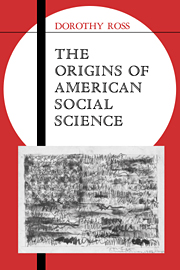Book contents
- Frontmatter
- Contents
- Acknowledgments
- Abbreviations used in the footnotes
- Introduction
- Part I European social science in antebellum America
- Part II The crisis of American exceptionalism, 1865–1896
- Part III Progressive social science, 1896–1914
- 5 The liberal revision of American exceptionalism
- 6 Marginalism and historicism in economics
- 7 Toward a sociology of social control
- 8 From historico-politics to political science
- Part IV American social science as the study of natural process, 1908–1929
- Epilogue
- Bibliographical note
- Indexes
- Ideas in Context
8 - From historico-politics to political science
Published online by Cambridge University Press: 23 September 2009
- Frontmatter
- Contents
- Acknowledgments
- Abbreviations used in the footnotes
- Introduction
- Part I European social science in antebellum America
- Part II The crisis of American exceptionalism, 1865–1896
- Part III Progressive social science, 1896–1914
- 5 The liberal revision of American exceptionalism
- 6 Marginalism and historicism in economics
- 7 Toward a sociology of social control
- 8 From historico-politics to political science
- Part IV American social science as the study of natural process, 1908–1929
- Epilogue
- Bibliographical note
- Indexes
- Ideas in Context
Summary
I have paid little attention in the last several chapters to the students of historico-politics. Economics and sociology enacted a two-stage drama of challenge to the traditional disciplines established in the Gilded Age and liberal revision of those traditions. The challenge raised the threat of socialism and it was necessary first to understand that threat in order to understand the new liberal versions of economics and sociology that formed in its shadow. In historico-politics the two stages were combined in one. The challenge to the gentry founders of historico-politics took shape more slowly and from the beginning it projected a moderate liberal vision of American exceptionalism.
The liberal historicist challenge
As in economics and sociology, the younger generation in historico-politics was born in the 1850s and 1860s, but their political orientation was more conservative. Although disaffection in economics and sociology came from egalitarian disillusionment with modern capitalism, in historico-politics it came more largely from elitist disillusionment with democracy. From the beginning, the younger generation sought a liberal historicist revision of American exceptionalist principle, not a radical transformation.
The Gilded Age crisis, with its center in the social question, seems to have steered young people who held more radical sentiments into economics and sociology, where they could deal directly with the problems of industrialization, class conflict, and inequality. The younger generation in historicopolitics lacked the background in dissenting evangelical piety and social millennialism so important to Richard T. Ely, Albion Small, and their confederates.
- Type
- Chapter
- Information
- The Origins of American Social Science , pp. 257 - 300Publisher: Cambridge University PressPrint publication year: 1990

